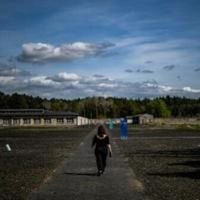On May 4, 2025, the 80th anniversary of the liberation of Ravensbrück, the largest Nazi concentration camp for women, was marred by controversy as reporters from Polish television were reportedly denied entry to the commemorative events. This incident has sparked outrage and raised questions about historical memory and the recognition of the suffering endured by the camp's inmates.
Ravensbrück was a site of immense tragedy during World War II, where approximately 130,000 women were imprisoned, including about 40,000 Polish women. Tragically, nearly half of these women lost their lives due to the brutal conditions, executions, and inhumane medical experiments conducted within its walls. Historians estimate that as many as 90,000 individuals may have died in Ravensbrück and its sub-camps, a stark reminder of the horrors of the Holocaust.
On April 29, 1945, the last SS troops fled the camp as the Red Army advanced, liberating the few remaining prisoners. Among those who suffered in Ravensbrück was Suzanne Bouvard, a young woman from Brittany who formed a deep bond with fellow inmate Simone Séailles, a Parisian resistance member. Their friendship became a symbol of resilience and hope amid the darkness of their shared experience.
As the anniversary approached, the significance of remembering such events became increasingly apparent. However, the denial of access to Polish media at the commemorative events has led to accusations of historical revisionism and insensitivity. Adrian Stankowski, a journalist with Telewizja Republika, expressed his dismay, stating, "We have a scandal. The team from Telewizja Republika was not allowed into the liberation ceremony at the former German concentration camp in Ravensbrück. This is very disturbing news."
Critics have drawn parallels between the treatment of Polish journalists and the historical injustices faced by the camp's inmates. Dawid Wildstein, another journalist, remarked, "Imagine the outcry if Israeli television had been denied access to Auschwitz. This is a slap in the face to Poles and to the victims of this hell." Such comments underscore the ongoing tensions surrounding the narrative of World War II and the Holocaust, particularly in relation to Poland's role and the memory of its citizens.
The Ravensbrück camp, operational from 1939 until its liberation, was notorious for its brutal conditions. Women held there faced starvation, forced labor, and systematic killings. Over 200 Polish women were executed by firing squad, and many others were sent to gas chambers. A crematorium operated in the camp from 1943, where the remains of the murdered were disposed of, often in nearby lakes.
As the anniversary of the camp's liberation drew near, the historical significance of Ravensbrück was highlighted by various organizations and survivors. Suzanne Bouvard, who survived the camp, chose to honor her experience by cultivating orchards after the war, symbolizing rebirth and the hope for a better future. Her story, intertwined with that of Simone Séailles, reflects the enduring human spirit in the face of unimaginable adversity.
However, the controversy surrounding the Polish media's exclusion from the anniversary events raises critical questions about how nations remember their pasts. The denial of access has been described as a troubling sign of a lack of respect for the memories of those who suffered in Ravensbrück. Stankowski's comments reflect a broader sentiment in Poland, where historical narratives are often contentious and deeply felt.
Moreover, the incident has prompted discussions about the role of media in commemorating historical events. As Wildstein pointed out, the exclusion of Polish journalists from such significant commemorations is perceived as a broader commentary on how Poland's history is acknowledged and respected. "Berlin is spitting in our face, knowing it can get away with it," he stated, highlighting the frustrations felt by many regarding historical recognition.
As discussions continue, it is crucial to remember the millions of lives affected by the atrocities committed during the Holocaust. The Ravensbrück camp remains a poignant symbol of the suffering endured by women during this dark chapter in history. The events of May 4, 2025, serve as a reminder of the ongoing need for open dialogue and acknowledgment of the past.
In conclusion, the controversy surrounding the 80th anniversary of the liberation of Ravensbrück encapsulates the complexities of historical memory and the importance of ensuring that all voices are heard in the narrative of the Holocaust. As survivors like Suzanne Bouvard continue to share their stories, it is imperative that we honor their experiences and the lessons of history, ensuring that such atrocities are never forgotten.


